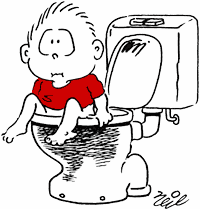Call me old fashioned. Toilet training is a rite of passage. It is something children need to master before entering school. Toilet training can generally start around 22 months to 30 months, and typically boys are trained by 38 months and girls at a slight more precocious 36. Effective toilet training requires muscle control, awareness of body activity and the motor skills to get on the toilet. In talks with pediatricians, it’s evident that this can evolve naturally, as children grow up and are increasingly uncomfortable with a soiled diaper. That’s when parental guidance comes in, educating the child about the body, supporting his or her growing awareness and being gently reassuring in the inevitable accidents that happen along the way.
Toilet training is not an epic drama, a game of thrones for the preschool set, if you will. Here at Time to Play, we are regularly sent the latest and greatest brainstorm product from some inventor who swears that his or her life-changing product will take the self-esteem crippling torments of toilet training away from your precious child. Please. Tactics we’ve seen include formally introducing your child to the toilet and having him or her making it a friend, and creating celebrations of effective elimination that rival the opening ceremonies of the Olympics. None of these really work, and many of them include ancillary products to purchase, which are neither necessary nor efficacious. Moreover, they can be confusing, creating a whole cast of characters and so much elaborate story that the basic need to be able to use the toilet like a big kid gets obscured in the theatrics.
Learning to use the toilet is more analogous to learning to ride a bike than a superhuman achievement. Yet, many of these “systems” and the books, products, videos and whatnot that accompany them tend to equate a successful bowel movement with some kind of heroism. Yes, it’s definitely life changing for a child, and it’s a gateway to being a “big kid,” but it should also be kept in perspective. The problem with making success dramatic is that it makes failure dramatic, and the goal should be to make toilet training a, you’ll pardon the expression, organic part of growing up.
So, what should you do? Like many things, it starts with understanding your child’s temperament. Every child is different and some may be shyer about this process than others. Very simply, get a potty-chair, or toilet attachment, introduce it to the child, and talk about the process, in terms that a child can understand. If a child is resistant, afraid or downright refuses, back off. Many parents are eager for whatever reason to accelerate the process, but pediatricians say you’ll be more successful for the long term if you don’t make a big deal out of it.
And that includes eschewing storybooks, ticker tape parades and other types of artificial theatrics. With success, your child will naturally feel proud, and you’ll want to reinforce the accomplishment. No matter how much you may be relieved when this rite of passage happens for your child, keep a lid on it. Pediatricians say that keeping toilet training as a naturally occurring event and as un-dramatic as possible is best for the child…and the parents.
Now, that said, there are plenty of books, such as “Everyone Poops” or “The Gas We Pass: The Story of Farts,” that explain biology in ways that kids of toilet training age can understand. For all their humor, many of these books stay fact-based. Bodily functions are a source of wonder—and comedy—for kids. That’s a given, and helping kids have a healthy understanding of these is good. But spare yourself most of the stuff out there that puts bladder and bowel control on a par with winning a Nobel prize. That’s the stuff you can just flush.

